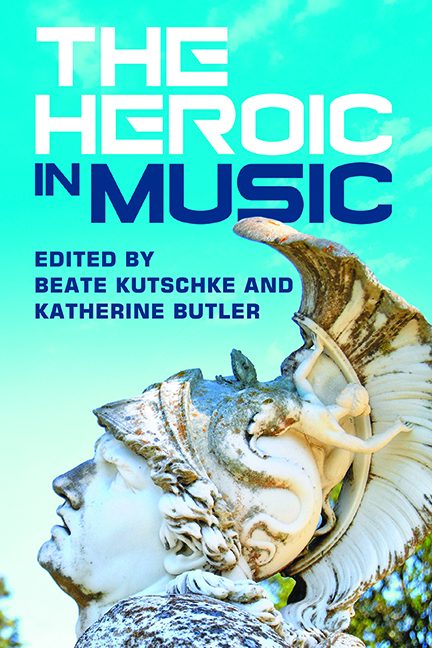Book contents
- Frontmatter
- Contents
- List of Illustrations
- Notes on Contributors
- Introduction
- Part I The Configuration of Heroic Music as a Tool for Shaping Moral and Political Identity
- Part II Music, its Ethics and Politics – Beyond ‘Beethoven Hero’
- Part III Heroic Music and its Moralities in Dictatorships and Post-Heroic Democracies
- Bibliography
- Index
1 - Holy Heroes: On the Varieties of a Metaphor and its Musical Expression in the Medieval Historiae
Published online by Cambridge University Press: 16 July 2022
- Frontmatter
- Contents
- List of Illustrations
- Notes on Contributors
- Introduction
- Part I The Configuration of Heroic Music as a Tool for Shaping Moral and Political Identity
- Part II Music, its Ethics and Politics – Beyond ‘Beethoven Hero’
- Part III Heroic Music and its Moralities in Dictatorships and Post-Heroic Democracies
- Bibliography
- Index
Summary
The medieval cult of saints finds its central expression in the liturgical celebrations for the saints’ feast days, that is, in the Mass and even more so in the liturgy of the Divine Office. In the chants of the Office, the stories of the saints – their spiritual achievements and their ‘heroic deeds’ – played a central role. This is already true for some Office cycles for apostles and famous martyrs from the Carolingian or Romano-Frankish period of plainchant-composition. In the saints’ offices of the High and Late Middle Ages, however, this narrative attitude is in fact so pronounced that they are commonly addressed as historiae.
The present chapter investigates the representation of the saints as ‘heroes’ and ‘heroines’ of their faith in these historiae. It considers, firstly, which aspects of the ‘heroic’ are alluded to in the texts of the historiae and, secondly, how these are articulated in the music. Naturally, this chapter is only able to select a few examples of some of the most prominent aspects of thematic relevance. Among the various medieval types of saint, it concentrates on the martyr, not least because violence, war, and conflict play key roles here, just as they do for secular heroes. (Basic information on the selected historiae and their stylistic features can be found in the appendix at the end of the chapter.)
Heroes and martyrs are exceptional individuals. They transgress the boundaries of human achievement and suffering, becoming role models for their societies as embodiments of ideal human beings. The analogies and continuities between the two are as obvious as their fundamental differences: due to their approximation of ideal values, heroes and martyrs can be regarded as representatives of contrasting worldviews. Ancient heroes and heroines are basically incapable of performing anything other than extraordinary feats while on earth due to their genealogical descent (they are usually the children of gods). They are victorious, they conquer, they rule, and as heroes they thus sometimes even become gods themselves. By comparison, the martyrs – particularly those of the first centuries of Christianity – are real anti-heroes and anti-heroines. Based on their imitation of Christ, they counter worldly fame and power with the moral perspectives of humility, non-violence, and brotherly love. As a consequence, they accept worldly failure. They are persecuted, tortured, and killed for their love of Christ, and throughout this they remain human, never becoming gods themselves.
- Type
- Chapter
- Information
- The Heroic in Music , pp. 13 - 31Publisher: Boydell & BrewerPrint publication year: 2022



